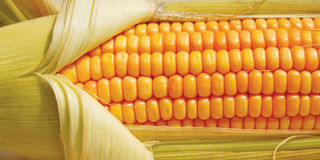GMOs ban to hit relief food efforts

Yellow maize imports have pushed down the price of raw material for animal feed manufacturers by 15 per cent. PHOTO | FILE | NATION MEDIA GROUP
What you need to know:
- On Wednesday, Public Health Minister Beth Mugo announced the ban that was to be implemented “with immediate effect”.
- Mrs Mugo was reacting to recent concerns by French researchers that GMO maize had caused cancers and damaged other body organs in rats. Russia has also taken similar action.
- The minister further directed public health officers to mop up any GMO foods that could be circulating in the local market.
Thousands of Kenyans relying on relief supplies would be the hardest hit by the ban on the importation of genetically modified foods.
“We have not yet assessed how this will affect the supplies at hand, let alone those in the pipeline,” Mrs Rose Ogola, a communication officer with the World Food Programme, told the Nation on Thursday.
On Wednesday, Public Health Minister Beth Mugo announced the ban that was to be implemented “with immediate effect”. (READ: GMOs banned as cancer fears grow)
Mrs Mugo was reacting to recent concerns by French researchers that GMO maize had caused cancers and damaged other body organs in rats. Russia has also taken similar action.
The minister further directed public health officers to mop up any GMO foods that could be circulating in the local market.
The National Biosafety Authority had approved 21 applications for the importation of various GMO foods, amounting to thousands of metric tonnes, by WFP between last September and this May.
The products, some of which were meant for transit to neighbouring countries, comprised soya meal, maize and corn meal.
A source close to the NBA said that apart from relief and research agencies, no other people have applied to import GMOs.
Local maize millers have been reluctant to import GMOs, arguing that the mandatory labelling requirement made the products less attractive.
During a recent meeting to discuss the issue of labelling, the Cereal Millers Association chairman Diamond Lalji said labelling GMO products created an impression that they were not safe.
“If we have any doubts, let us do away with them,” he said.
But Mr Wanjiru Kamau of the Kenya Organic Agricultural Network, say this was no evidence that such products were not circulating in the local market.




